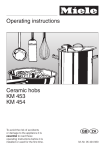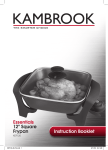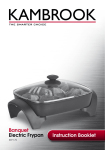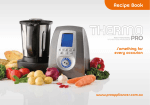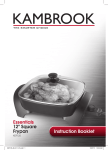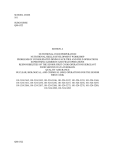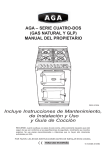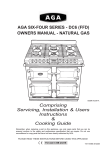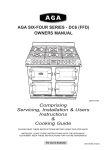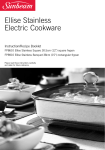Download Kambrook KD66B User's Manual
Transcript
CombiSteamer/Frypan UE GO ME GO OD NA OD VAL KD66B 2 Issue 1/00 Kambrook Safety Welcome to Kambrook and your new Versatile Combi-Steamer/Frypan. At Kambrook we believe that the safe performance of our products is the first priority in any consumer product so that you, our valued customer, can confidently use and trust our products.We ask that any electrical appliance that you use be operated in a sensible fashion with due care and attention placed on the following important operating instructions: This appliance is not intended for use by young children or infirm persons without supervision. READ ALL INSTRUCTIONS THOROUGHLY BEFORE ACTIVATING THE APPLIANCE AND RETAIN THEM FOR FUTURE REFERENCE. Do not let the cord hang over the edge of a table or counter, touch hot surfaces or become knotted. Do not leave the appliance unattended when in use. Young children should be supervised to ensure that they do not play with the appliance. Always use the appliance on a dry, level surface Do not place this appliance on or near a hot gas or electric burner, or where it could touch a heated oven Ensure that the power source to be used is the same as the voltage requirements of the product. This appliance is for household use only. Do not use this appliance for other than its intended use. Do not use outdoors. Switch off at the power outlet and then unplug and remove the temperature control probe when the appliance is not in use and before cleaning. Allow all parts to cool before dissembling for cleaning Extreme caution must be taken when using this appliance filled with hot oil or other liquid. Do not move during cooking and allow to cool before removing oil or other liquid. Never immerse the power cord, plug or control probe in any form of liquid. Regularly inspect the power cord, plug and actual appliance for any damage. If found damaged in any way, immediately cease use of the appliance and return the entire appliance to the nearest authorised Kambrook Service Centre for examination, replacement or repair. Before inserting the temperature control probe into the socket ensure the interior of the socket is fully dry.To do this, shake out excess water then wipe the interior of the socket with a dry cloth. Do not touch hot surfaces, use handles or knobs Please call 1800 800 634 for Kambrook Service Centre details. Do not immerse the cord or temperature control probe in water or any other liquid. 2 Features of your Kambrook Versatile Combi-Steamer/Frypan 4 3 7 5 5 6 1 9 2 8 10 1. Frypan Base with non-stick surface and heavy-duty cool-touch phenolic handles for table serving. 6. Reversible chrome plated rack – ideal for roasting and steaming. 7. 2 Pan dividers to separate foods while cooking 2. Stainless Steel Steaming Tray with multiple steam holes for maximum efficiency. 8. 4 Anti-scratch cool touch feet on base 3. Stainless Steel Domed Lid – can be inverted for compact storage. 9. Temperature control probe with 10 heat settings gives you accurate temperature control from simmering through to searing and sealing. 4. Cool Touch Adjustable Steam Vent – open for crisper texture or closed for when softer texture is desired. 10.Indicator light cycles on and off during cooking showing that it is maintaining the preset temperature 5. Cool-touch handles on steaming tray. 3 Using Your Kambrook Versatile Combi-Steamer/Frypan Before first use remove any promotional labels and wash the Combi-Steamer/Frypan in warm, soapy water. Rinse and dry thoroughly especially the heat control socket.To ensure the interior of the socket is fully dry, shake out excess water then wipe the interior of the socket with a dry cloth. When cooking is completed, turn the dial on the temperature control probe to ‘O’ and turn power off at the power outlet and then unplug. Leave the temperature control probe connected to the CombiSteamer/Frypan until cool. This appliance must be used with the temperature control probe provided. Do not use any other temperature control probe or connector. Although the Combi-Steamer/Frypan is fully immersible, the temperature control probe should never be immersed in water or any liquid. The Temperature Control Probe has 10 heat settings for accurate temperature control, from lowest setting “simmering” through to No. 10 for searing and sealing. The Indicator light switches off automatically when the correct temperature is reached and will cycle on and off during cooking. Place the Combi-Steamer on a level, flat surface. “Condition” the non-stick surface by applying a thin smear of cooking oil over the surface with a soft cloth or paper towel Set the temperature control probe to ‘O’, fully anti-clockwise. Insert the temperature control probe firmly into the socket on the side of the Combi-Steamer/Frypan Base.Then plug the cord into a 230/240volt power outlet and then turn the power on. Always insert temperature control probe into the CombiSteamer/Frypan first, and then plug the power cord into a power outlet. The Kambrook Combi-Steamer/Frypan is now ready for use. Select the desired heat setting.The indicator light will signal that the element is heating up, and turn off when the temperature is reached.The indicator light will cycle on and off during cooking, indicating that the correct temperature is being maintained. Adjust setting up or down as needed. 4 Maintaining your Kambrook Combi-Steamer/Frypan One-level Steaming Steaming rack in steaming position. Always turn the power off at the power outlet and then unplug the CombiSteamer/Frypan and allowing the unit the cool down before disassembling any parts. Two-level Steaming Steaming rack in steaming position inside steaming tray. After the unit has cooled down remove the temperature control probe from the socket, it can be wiped with a slightly damp cloth but DO NOT immerse the temperature control probe in water or any other liquid. Three-level Steaming Frypan in place with steaming tray on top with the Steaming Rack (in steaming position) placed in the steaming tray. The frypan, steaming tray and lid are fully immersible and dishwasher safe. If washing by hand use hot soapy water. Do not use abrasive cleaners, steel wool or scouring pads as these can damage the non-stick surface. Steaming Smaller Portions of Food 2 Pan dividers are used inside the steaming tray. Rinse and dry all parts thoroughly especially the socket where the temperature control probe is inserted.To ensure the interior of the socket is fully dry, shake out excess water then wipe the interior of the socket with a dry cloth. Poaching Steaming rack in roasting position. After washing the Combi-Steamer/Frypan base in the dishwasher, “condition” the cooking surface with cooking oil and a paper towel, as the dishwasher is more abrasive than hand washing. Roasting Steaming rack in roasting position. How to Use Your Versatile Kambrook Combi-Steamer/Frypan Steaming Bread Steaming rack in roasting position inside steaming tray (for greater steam circulation). Your Combi-Steamer/Frypan is designed to cook a complete meal in one appliance. The accessories can be stacked or used interchangeably for greater cooking convenience. 5 Hints and Tips: Shallow frying All cooking guides and recipe times are to be used as an indication only, as the freshness, size, and cuts etc. of vegetables and meats used will vary the cooking times Recommended temperature control setting: 6 – 8 Less oil is used (about 1.5cm) for shallow frying and the food is usually cooked at a lower temperature so that a delicious brown crust forms on the underside.The food is then turned over and the process is repeated. Read recipes over once before starting to cook Pan-Frying Recommended temperature control setting: 4 – 6 Have all ingredients at hand before cooking commences Little or no fat is used, depending on the fat content of the food.When frying, it is important not to crowd the pan: food will then stew rather than brown Cooking times in the following recipes serve as a guide only.The quality of the meat, freshness and ripeness of the vegetables, the size and the starting temperature of foods could cause the time to vary. Roasting Recommended temperature control setting: 10 & 3 The meat is first browned in a little fat or oil on No. 10,then roasted using the steaming rack, (roasting position) with the temperature control probe on No. 3 and the lid on.The roast then needs to be and basted occasionally. Foods, which overcook easily, should be removed form the Combi-Steamer/Frypan as cooking is finished. Try to dry meat, poultry or vegetables before adding to hot oil to prevent unnecessary spattering. Boiling Recommended temperature control setting: 4 Boiling can be a very nutritious way of serving fresh vegetables if it is done properly. Always have the water boiling and add some salt before adding the vegetables. In order that heat penetrates quickly, boil the vegetables in small batches. Use the liquid after boiling for soups or gravies. Be sure the water is boiling before food is added for steaming and always replenish with boiling water during steaming. Season food after steaming for greater nutrient retention. Adjust temperature control probe setting up or down as needed for desired cooking. Poaching/Bain Maire Cooking Guides Recommended temperature control setting: 4 The thermostatically controlled CombiSteamer/Frypan makes it ideal for cooking a wide variety of foods, as the recipes in this book demonstrate. By simply adjusting the temperature control you are assured of perfect results every time. Both methods are especially good for foods requiring gentle heat, for instance eggs, quenelles and custards. In poaching, food is in direct contact with simmering liquid (water, stock, milk, etc) and in bain marie, the food is placed in a heat resistant dish and then partially immersed 6 in water. Stand the dish on the steaming rack (roasting position) to avoid direct contact with the bottom of the CombiSteamer/Frypan. Braising and Stewing Recommended temperature control setting: 3 The technical difference between a braise and a stew is that in a braise the meat is always cooked “covered”, for instance, browning it to form a crust (or “cover”) so that meat is cooked in steam.The meat is usually cooked in one piece and either placed on the steaming rack (roasting position) above some liquid or over a bed of vegetables.The meat for a stew may be browned first if desired, but the aim is to extract the flavour from the meat to make a delicious gravy. Both methods require gentle simmering in a closed pan. Steaming Recommended temperature control setting: 4 Steamed food remains moist and succulent and can be carried out without constant attention; the water may need to be replenished during long periods of steaming. Place the food in steaming tray or stand on the steaming rack (steaming position) and add 4 cups of water to the frypan base. IMPORTANT: Remember always replenish with boiling water. Remove food as soon as steaming is finished. Slow Cooking Recommended temperature control setting: 3 Cooking at low temperature is particularly beneficial to tougher cuts of meat.When cooked, the meat merely becomes firm so that is slices evenly without tearing apart. There is little shrinkage and juices, flavour and nutrition value are retained. Minimum Moisture or “Waterless” Cooking Recommended temperature control setting: 4 Another advantage of slow cooking is the convenience factor. After a few minutes of initial preparation, the food can be left to cook for hours, or even a whole day, with the minimum of attention. And should you wish to speed up cooking at any time, simply turn the temperature control probe to No. 4-5 Vegetables cooked this way are nutritious and remain succulent and crisp to the bite.The success of this method depends upon efficient heat control, so take the time to experiment with your new Combi-Steamer/Frypan. Start by adding two to three tablespoons of water to the pan - most vegetables can be cooked without additional water the water that clings to the vegetables after washing is usually sufficient - then add the vegetables, cover and bring to boil. Lower heat immediately and cook until done. Alternatively, start by frying the vegetables on No. 6 in two to three tablespoons of oil for a few minutes. Add three tablespoons of water, cover and lower the heat so no steam escapes; then cook until done. Keep Warm/Simmer Recommended temperature control setting: 1 – 2 Food can be kept warm or at a slow simmer for latecomers or second helpings. Ideal for heating up buns. Table Cooker Recommended temperature control setting: 10 – 4 Present your Combi-Steamer/Frypan at the table (Use a heat resistant mat to protect your table from the heat of the Combi-Steamer/Frypan) for a ‘Hot Rock’ style dinner, or try Mongolian Hot Pot (recipes not included) 7 Temp. Control Setting Meat Type Cooking Time Rolled Roast Beef 11/2 – 2 kg Setting 3 Leg of Lamb Roast 11/2 – 2 kg Rare 11/4 – 11/2 hours Medium 11/2 – 13/4 hours Well Done 11/2 – 2 hours Medium 11/4 – 11/2 hours Well Done 13/4 – 2 hours 1 Setting 5 Setting 8 Roast Pork 1 /2 – 2 kg 21/2 – 3 hours Roast Chicken 11/2 – 2 kg 1 – 11/2 hours Fried Bacon 4 – 6 minutes French Toast 2 – 4 minutes Sausages 10 – 15 minutes Hamburgers (20mm thick) 6 – 8 minutes Lamb Chops 10 – 20 minutes Porterhouse Steak Rare (10–25mm thick) Rare 10 – 15 minutes Setting 10 for 4 minutes then to Setting 8 Minute Steak (3 – 6mm thick) Chicken – Thigh Medium 15 – 20 minutes Well Done 20 – 25 minutes Rare 2 minutes Medium 4 minutes Well Done 6 minutes 10 – 15 minutes or until cooked – Drumsticks 15 – 20 minutes or until cooked – Breast 20 – 25 minutes or until cooked Pork Loin Cutlets 10 – 15 minutes or until cooked Scotch Fillets 10 – 15 minutes or until cooked the quantity of liquid.The general rule-ofthumb is to use any good quality red or robust wine for meat and white or light wine for chicken. Let your taste be your guide. Steaming Vegetables The following vegetables can be successfully steamed in the CombiSteamer/Frypan by placing them inside the steaming tray or steaming rack provided. Bring 4 cups of water to boil then turn the temperature control probe to Setting ‘4’ before adding the vegetables. Always replenish with hot water. Guide to roasting Place steaming rack in appliance (roasting position) and place meat on top. Cover and roast according to the chart above. Note: For golden appearance quickly panfry before steaming. Guide to steaming Meat and chicken can also be steamed. As moist heat penetrates twice as quickly as dry heat, steaming meat or chicken will only take about half the time of roasting. Simply place the meat on top of the steaming rack (steaming position) or steaming tray and add 4 cups of water to the pan for steaming. For that special occasion, you can use wine – up to half Note:Cooking times will vary based on the size of the vegetables being cooked and personal taste preference. 8 Vegetable Steaming Chart Ingredients Preparation Time on Temperature Control Setting 4 Artichoke Trim stalks and leaves; keep whole Place in steaming tray or steaming rack and steam for 20 – 30 minutes Asparagus Trim stalks; cut or leave whole Place in steaming tray and steam for 5 – 7 minutes Beans Remove stem and string; cut or leave whole Place in steaming tray and steam for 12 minutes Broccoli Remove leaves and ends of tough stalk. Keep whole or separate into spears or flowerets Place whole broccoli on steaming rack and flowerets in steaming tray and steam for 10 – 15 minutes Brussels sprouts Discard wilted leaves and trim ends Place in steaming tray and steam for 20 minutes Cabbage Discard wilted leaves; keep whole or quartered Place whole on steaming rack and quarters in steaming tray and steam for 10 – 15 minutes Carrots Scrape or peel and cut off end. Keep whole or separate into flowerets Place in steaming tray and steam for 20 minutes Cauliflower Remove leaves and cut off end. Keep whole or separate into flowerets Place whole cauliflower on steaming rack and flowerets in steaming tray. Steam for 15 – 20 minutes Celery Remove strings and leaves. Cut into 5cm pieces. Place in steaming tray and steam for 5 – 7 minutes Eggplant/ aubergine Remove stem, slice 1.3cm thick. Sprinkle Place in steaming tray and steam for with lemon juice if not using immediately 3 – 5 minutes Mushrooms Scrub and trim ends. Keep whole or quartered Place in steaming tray and steam for 3 – 5 minutes Capsicum Remove stem and seeds. Keep whole or cut as desired Place in steaming tray and steam for 4 – 6 minute Parsnips Peel and remove tops. Cut into quarters or 1.3cm slices Place in steaming tray and steam for 20 minutes Peas (fresh) Remove pods Place in steaming tray and steam for 10 – 12 minutes Peas (frozen) Place in steaming tray and steam for 5 – 7 minutes Pumpkin Remove the seeds and cut into small pieces Place in the steaming tray and steam for 20 – 25 minutes Potatoes Peel and keep whole or quartered Place whole on steaming rack and qtrs. in steaming tray. Steam for 20 – 25 minutes or 10 – 15min for quarters. Zucchini/ courgettes Remove blossom and stem ends. Cut into 1.3cm slices Place in steaming tray and steam for 10 – 12 minutes Method for Steaming Rice METHOD INGREDIENTS COOKING Rice cooked directly in the Combi-Steamer/Frypan frypan Wash and rinse well. Combine 1 cup rice and 13/4 cup water Put in appliance, cover (vent closed) and bring to boil on Setting 8, then simmer for 20 minutes on Setting ‘4’. Rest for 5 minutes before serving Rice cooked in a heat resistant bowl inside the CombiSteamer/Frypan with water for steaming in the frypan base. Wash and rinse well. Combine 1 cup rice and 13/4 cup water. Put in a 1 litre heat resistant bowl Place on steaming rack, cover and bring to boil on Setting 8, then simmer for 20 minutes on Setting ‘4’. Rest for 5 minutes before serving. Method for Steaming Chicken Chicken Cooking time on Temperature Control Setting 4 Breast 20 – 25 minutes Thigh 20 – 25 minutes Legs (drumstick) 30 – 35 minutes 10 Method for Seafood The cooking time of fish (and seafood) is based upon thickness rather than on weight. Fish should be washed quickly and thoroughly to preserve the natural taste and flavour. Avoid overcooking fish remember it will continue to cook after it is placed on a serving dish. Allow frozen fish to thaw before steaming for more even cooking. Seafood A handful of fresh herbs, a few aromatic vegetables (such as carrots and celery), garlic, vinegar, lemon, peppercorns or cloves, etc. and a good quality white wine when added to the steaming liquid will impart extra flavour to the steaming food. Reduce the steam liquid and use it as a base for soups or sauces. Cooking Time at Control Setting 4 Clams – small – medium – large 3 minutes 6 – 8 minutes 10 – 12 minutes Crabs – small – medium – large 7 – 10 minutes 15 minutes 20 – 25 minutes Fish – flat (sole) – fillets 5 – 7 minutes 5 – 7 minutes – round (trout) – steaks 2.5cm thick 10 – 12 minutes 5 – 8 minutes Lobsters – – – – small tails medium large Mussels 15 15 20 25 minutes minutes minutes minutes 5 – 8 minutes Oysters, shucked 3 – 5 minutes Prawns 4 minutes 6 – 8 minutes 10 – 12 minutes – small – medium – large 11 Recipes Sesame pumpkin Potato and spinach salad Serves 4 600g pumpkin, (Queensland Blue or Japanese pumpkin) cut into 3cm pieces Dressing: 2 tablespoons peanut oil 3 tablespoons toasted sesame seeds 1 tablespoon honey 1 tablespoon lemon juice 1 tablespoon soy sauce Serves 4 – 6 800g new potatoes 1 medium Spanish onion, finely chopped 1 cup thinly sliced green shallots 1 /2 bunch English spinach 2 tablespoon freshly snipped chives 1 /2 cup roasted pine nuts Dressing 3 /4 cup mayonnaise 2 tablespoons sour cream 1 1/2 tablespoons lemon juice Freshly ground black pepper 1. Fill frypan reservoir with 4 cups of water and place the steaming rack in the steaming position and place in the pumpkin.Turn the temperature control probe to ‘10’. 1. Fill frypan reservoir with 4 cups of water and place in the metal steaming rack, in the steaming position.Turn the temperature control probe to ‘10’. 2.When the water comes to the boil, cover with the lid 2.When the water comes to the boil place the potatoes in a single layer on the steaming rack and cover with the lid. 3.Turn the temperature control probe to ‘4’ for 20 - 25 minutes and/or until pumpkin is cooked. 3.Turn the temperature control probe to ‘4’.The potatoes will be ready in approx. 20-min. 4. Combine the oil, sesame seeds, honey, lemon juice and soy sauce in screw top jar. Shake well. 4.To check the potatoes pierce them with a thin skewer. If the skewer is easy to insert, the potatoes are cooked. 5. Pour dressing over pumpkin. Serve. 5.While the potatoes are cooling wash the spinach, let the spinach dry, and then cut the leaves into thin strips. 6. Slice the potatoes in half while they are still warm, combine the dressing ingredients and pour dressing over potatoes, add the spinach, pine nuts, chives, onion and shallots. 7. Season with freshly ground black pepper and milled rock salt. Serve. 12 Steamed salmon cutlets with hokkien noodles Steamed octopus with coriander and ginger Serves 2 2 salmon cutlets 150 – 200g each 300g hokkien noodles 200g snow peas, trimmed and cut in strips 2 tablespoons sweet soy sauce Serves 4 1 kg baby octopus, cleaned and cut in half 2 tablespoons freshly squeezed limejuice 2 tablespoons finely grated ginger 2 tablespoons sweet Thai chilli sauce 3 /4 cup fresh coriander leaves 1 tablespoon fish sauce 1 tablespoon of sesame oil 1 /4 cup finely chopped green onion 1 /4 cup finely chopped fresh coriander Freshly ground black pepper 1. Place the octopus into a bowl, add the remaining ingredients and mix well 1. Fill frypan with 4 cups of water and place the steaming rack in the steaming position.Turn the temperature control probe to ‘10’ 2. Marinate the octopus for 4 hours in the refrigerator 3. Fill frypan reservoir with 4 cups of water and place the steaming tray on top of the frypan. 2.When the water comes to the boil, place the salmon in a single layer in the steamer tray and cover with the lid. 4.Turn the temperature control probe to ‘10’ 3.Turn the temperature control probe to ‘3’ 5. When the water comes to the boil place the drained octopus into the steaming tier and cover with the lid. (Keep any left over marinade to place on the octopus when cooked.) 4.After 4 min place the hokkien noodles into the steaming tier, place the steaming tier onto the frypan and replace the lid 5. Combine all the other ingredients in a bowl 6.Turn the temperature control probe to ‘4’ for 10 – 12 minutes and/or until octopus is cooked 6.After 4 min remove the noodles and salmon. Place the noodles into the bowl to combine with the other ingredients 7. When the octopus is cooked mix with the left over marinade. 7. Serve the drained noodles onto a plate and top with the salmon, grind some black pepper and drizzle the noodle dressing onto the plate 8. Serve warm with either mixed salad or steamed rice. 13 Chicken and mushroom risotto Tuscan herb chicken Serves 4 2 x chicken breast fillets (300g) 1 tablespoon butter 1 tablespoon olive oil 1 medium onion, finely chopped 1 clove garlic, crushed 1 cup of sliced button mushrooms 300g arborio rice 31/2 cups chicken stock 1 /4 cup freshly chopped basil and chives 1 /2 cup of grated Parmesan Freshly ground black pepper Serves 4 1 x 1.6kg chicken, giblets removed 2 tablespoons lemon juice 1 tablespoon fresh white bread crumbs 1 egg Zest of 1 lemon 1 /2 bunch of sage Tuscan dried herb seasoning Preparation 1.Wash and pat the chicken dry. 2. Combine the breadcrumbs, egg, lemon juice, lemon zest and sage leaves to form the stuffing. Place the stuffing inside the cavity of chicken. 1. Steam the chicken breasts as per the steaming guide. 2. Heat the butter and oil in the frypan and lightly saute the onion and garlic. Add the rice and mix through until the rice looks shiny. 3. Sprinkle the chicken generously with Tuscan seasoning. Serve Roasting 1. Using the frypan with the temperature control probe on ‘8’, brown the breast sides of the chicken. Remove the chicken 3.Add the chicken stock and bring to the boil. 4.Wash the sliced mushrooms and pat dry add to the rice and stock 2. Place the steaming rack, in the roasting position, into the frypan.Turn the temperature control probe to ‘3’. Place the chicken onto the steaming rack, and replace the lid with the steam vent open. 5. Set thermostat probe to ‘3’ for 30 minutes and/or until rice is cooked. 6.While the rice is cooking stir occasionally, add more stock if the rice appears to be too dry. 3. Check the chicken every 1/2 an hour, it should be ready after 1-11/2 hours. 7. Slice the cooked chicken; add to the risotto with the chopped mixed herbs, freshly milled pepper and grated parmesan. Serve 4.To check the chicken, pierce the thigh with a skewer, if the resulting juices are clear the chicken is cooked. 14 5. Reduce the temperature control probe to ‘3’ – ‘4’ and gently simmer for 3 – 4 minutes. Remove the egg from the water with a slotted spoon, drain on absorbent paper. Orange pikelets Makes approximately 15 1 cup self-raising flour 2 teaspoons sugar 1 egg 2 teaspoons of melted butter or margarine Rind of 1 orange 1 /2 cup milk 6. Serve on toast or on top of your favourite salad NOTE: The freshness of the egg is very important to how well it cooks. A good poached egg will have the white surrounding the yolk 1. Sift the flour into a bowl, add sugar. 2. Make a well in the centre and break in the egg. Add the cooled butter, orange rind and almost all the milk. 1. Mix with a wooden spoon until the mixture is smooth adding extra milk if the mixture is too thick. 2. Heat the fry pan, turning the temperature control probe to ‘3’. 3. Cook spoonfuls of the pikelet mixture until bubbles break the surface. 4.Turn pikelets over to cook the second side. Remove and serve hot or cold with butter, honey or lemon butter. Poached eggs Serves 1 1 cup water 1 /4 teaspoon salt 1 /2 teaspoon vinegar 1-2 eggs 1. Place 4 cups of water into the frypan 2. Set the temperature control probe to ‘10’, place the vinegar and salt into the water. Bring the water to the boil. 3. Break each egg into a cup 4. Gently ease the egg into the boiling water. 15 Madras beef curry with tomatoes and chickpeas Kashmire roast lamb Serves 6 1 x 2kg leg of lamb 2 tablespoons peanut oil 1 teaspoon ground cumin 2 teaspoon grated ginger 1 tablespoon lemon juice 2 cloves garlic, crushed: 1 cup hot water 1 teaspoon garam masala: Serves 4 500g diced beef (blade, round or chuck steak) 1 medium brown onion (diced) 2 teaspoon minced garlic 1 teaspoon bottled chilli paste 11/2 tablespoons madras curry paste Freshly ground black pepper 3 tablespoon peanut oil 2 440g tins of peeled tomatoes 1 375g tin of chickpeas 1.Trim lamb of fat, score surface. Combine ginger, garlic, oil, garam masala, and ground cumin and lemon juice. Rub over lamb. 1. Heat the frypan on ‘10’ using the temperature control probe. 2. Place the temperature control probe into the frypan and turn to ‘10’ when the frypan has reached temperature seal the lamb leg and then remove it. 2.Add the peanut oil and diced beef to the frypan and seal the meat to a goldern brown colour. Remove the meat using a slotted spoon. 3. Place in the steaming rack in the roasting position and add the hot water. Place the lamb onto the steaming rack, turn the temperature control probe to ‘3’. Cover with frying pan lid, Cook until done to the desired tenderness 1 3/4 hours, basting occasionally. 3.Add the onion to the frypan and turn the temperature control probe to ‘6’. Cook the onion for 5 min, add the chilli and garlic and cook for a further 2 min. 4.Add the curry paste and cook for 3 min. add the beef and tomatoes, bring the curry back to the boil, then turn the temperature control probe to ‘3’ and replace the lid with the steam vent open. 4. Place lamb on serving platter. Cover; allow to rest for 10 minutes, before carving. 5.The curry will take approx. 1 1/2 hours to cook, it should be checked every 1/2 an hour. 6. Open the chickpeas and wash them, add to the curry when it is cooked, check the seasoning. 7. Serve with steamed rice and pappadams, garnish with chives. 16 Notes 17 Notes 18 Kambrook 12 Month Replacement Warranty KAMBROOK warrants the purchaser against defects in workmanship and material, for a period of 12 months from the date of purchase (3 months commercial use). Guarantee and purchase receipt for this product are to be retained as proof of purchase and must be presented if making a claim under the terms of the KAMBROOK guarantee. KAMBROOK reserves the right to replace or repair the appliance within the warranty period. Warranty does not apply to any defect, deterioration, loss, injury or damage occasioned by, or as a result of the misuse or abuse, negligent handling or if the product has not been used in accordance with the instructions.The guarantee excludes breakages and consumable items such as kneading blades. This warranty is void if there is evidence of the product being tampered with by unauthorised persons. If the product includes one or a number of accessories only the defective accessory or product will be replaced. In the event of KAMBROOK choosing to replace the appliance, the guarantee will expire at the original date, ie. 12 months from the original purchase date. In Australia, this KAMBROOK Guarantee is additional to the conditions and guarantees which are mandatory as implied by the Trade Practices Act 1974 and State and Territory legislation. For service, spare parts or product information in Australia, please call KAMBROOK on the Customer Service Line (free call) 1800 800 634. For service, spare parts or product information in New Zealand, please call KAMBROOK New Zealand, Mono Place, Ellerslie, Auckland Phone 0800 253 007 Fax 0800 263 001 If claiming under this guarantee the product must be returned freight prepaid. YOUR PURCHASE RECORD (Please complete) Attach purchase receipt here. DATE OF PURCHASE______________________________________________________ MODEL NUMBER ________________________________________________________ SERIAL NUMBER (If applicable) ______________________________________________ Please don’t return purchase record PURCHASED FROM ______________________________________________________ until you are making a claim Kambrook 4 Kingston Town Close Oakleigh,Victoria 3166, Australia Customer Service Line (free call) 1800 800 634 Customer Service Fax 1800 621 337 Kambrook (New Zealand) Mono Place Ellerslie, Auckland, New Zealand Customer Service Line/Spare Parts 0800 253 007 Customer Service Fax 0800 263 001 UE GO ME GO OD NA OD VAL Due to continual improvement in design or otherwise, the product you purchase may differ slightly from the illustrations in this book. Issue 1/00




















